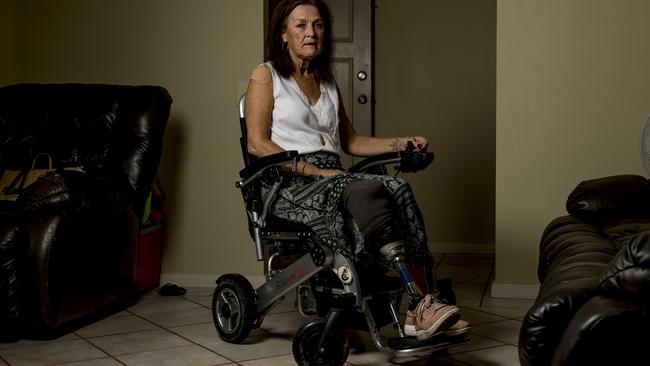Legalise Cannabis Qld: Debra Lynch defends drug charges
‘A life so full of pain and agony and despair is no life’: The vice president of Legalise Cannabis Queensland party who is a candidate in Saturday’s election is fighting an epic court battle to defend drug charges.
Local
Don't miss out on the headlines from Local. Followed categories will be added to My News.
The vice-president of the nascent Legalise Cannabis Queensland party, who is also a candidate in Saturday’s State Election, has pleaded the defence of emergency to 11 drug charges stemming from her use of cannabis to self-medicate her numerous diseases, one of which is terminal.
Burleigh Waters woman Debra Leigh Lynch, who is the LCQ candidate for Mermaid Beach, was charged with offences including two counts of producing dangerous drugs, two counts of possessing dangerous drugs, and four counts of possessing utensils following a police search warrant of her then-Cornubia residence on June 19, 2017.
Sex fiend’s perverted acts behind library bookshelf
Dawn spirits, six-shot night sinks drink driving beauty
‘Tissues, blood, vomit’: Tradie’s big night behind the wheel
Beenleigh Magistrates Court heard on Thursday that Ms Lynch admitted possession of all the items discovered during the search warrant.
Despite this admission, Ms Lynch and her legal team led by barrister Michael Horvath argued she should be found not guilty by virtue of the emergency defence, which requires proving it “could not be reasonably expected that an ordinary person would act differently in that situation”.

Ms Lynch, who hasn’t been able to work since 1997, took the stand to discuss her difficult life and why it drove her into the arms of cannabis.
She began experimenting with cannabis in 1988 when she suffered a spinal injury at work, which crushed a disc and left her with nerve pain in her legs and back spasming.
This was unable to be remedied despite multiple surgeries.
In 2013 – 14, Ms Lynch was also diagnosed with Raynaud’s disease, which cuts off circulation to her extremities, and Buerger’s Disease, which causes blood vessels to swell and clot.
The effect of the former is she gets painful ulcers on her extremities, sometimes to the bone; while that of the latter is she becomes susceptible to gangrene, which claimed her right leg below the knee after the June 2017 search warrant.
The year of 2013 – 14 is also when she discovered she had diffuse systemic scleroderma, which affects her organs and tendons and causes painful fibrous lesions all over her body.
The condition is terminal.
On the mental front, Ms Lynch is afflicted with PTSD, manic depression and a chronic pain disorder.
Ms Lynch told the court she had been prescribed a variety of opioids, anti-inflammatories and sleeping pills, but they left her “vomiting, nauseous, agitated and sleepless”.
“The side effect of the opiates were overwhelming,” she said.
“I was suicidal – there was no quality of life.
“The thought of dying never went away.”
This changed, however, with cannabis, which she smoked, made into oils, balms and tinctures, vaporised and ingested increasingly throughout the 2010s.
“I had explored and exhausted my options,” Ms Lynch said.
“This was the only thing keeping me alive.
“A life so full of pain and agony and despair isn’t a life.”
Police prosecutor Sgt Stephen Cochrane told the court that be that as it may, Ms Lynch had not gone through the proper channels to consume the drug.
The court heard Ms Lynch was rejected for the NSW Terminal Illness Cannabis Scheme, as she was not a NSW resident, and she was unable to secure a prescription under the Queensland Public Health (Medicinal Cannabis) Act 2016, despite her evidence that she asked dozens of doctors and health professionals for one.
The court heard she has since obtained a prescription for medicinal cannabis, but still prefers illicitly bought cannabis as it is far cheaper and of better quality, in her submission.
Sgt Cochrane submitted that for the court to accept the defence of emergency, it would need to accept that virtually every day of Ms Lynch’s life since 1988, when she first began smoking cannabis for her back injury, was an emergency.
“There was no sudden emergency on June 19, 2017,” Sgt Cochrane told the court.
“It was the same for Ms Lynch as every other day.”
Magistrate Clare Kelly reserved her decision until November 10.

